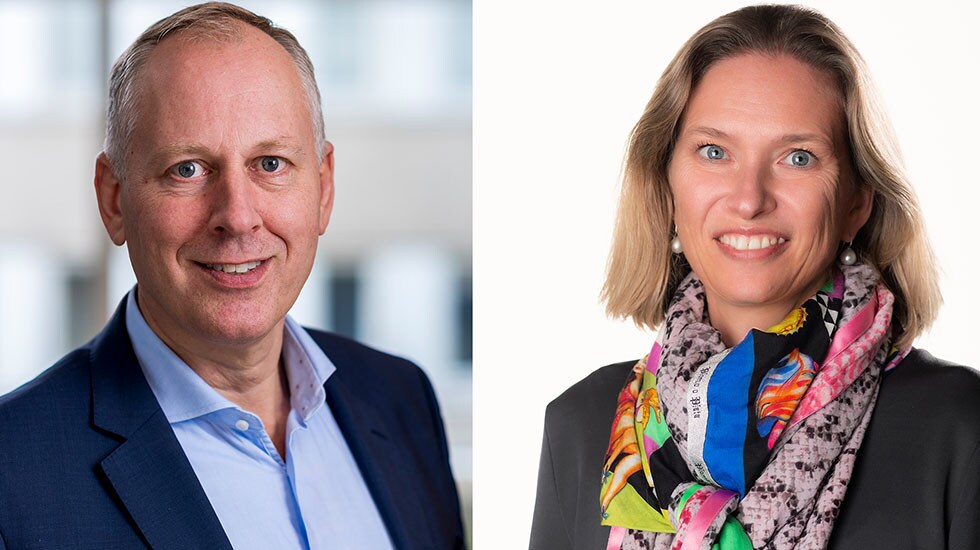European trade association COCIR consolidates its advocacy and action plans ahead of 2024 European parliament elections
Coinciding with the COCIR’s 65th anniversary, Philips’ Jan-Willem Scheijgrond takes over its presidency to help steer the future of Europe’s healthcare technology industry
May 08, 2024 | 4 minute read
In March 2024, Philips Vice-President and Global Head of Government & Public Affairs Jan-Willem Scheijgrond was elected president of COCIR, the European Trade Association representing the medical imaging, radiotherapy, health ICT and electromedical industries. We spoke to Jan-Willem and COCIR Secretary General Annabel Seebohm about the role of COCIR and the challenges the EU faces in delivering better care to its citizens and maintaining the block’s competitiveness in global healthcare markets.

Q. What is COCIR, what are its aims, and what has it achieved over the years?
Annabel Seebohm (AS) : COCIR is a European Trade Association founded in 1959 and headquartered in Brussels that represents the medical technology industry in the EU in three specific areas – radiology imaging, image-guided therapy, and health ICT. It provides a collective voice for these sectors, advocating towards European institutions to ensure the industry’s concerns are heard and addressed. In terms of disease areas, COCIR primarily focuses on non-communicable diseases, notably cancer and more recently cardiovascular disease, but it also plays a crucial role in disaster preparedness – for example, advocating for strategic stockpiling of medical supplies and critical device lists. It also promotes research into sustainable healthcare solutions, aiming to provide safe and effective treatments. In recent years, COCIR has actively contributed to Europe’s Beating Cancer Plan by advocating for comprehensive screening recommendations and increased access to radiotherapy. It also played a pioneering role in shaping the European Health Data Space, ensuring that legislative frameworks support innovation while safeguarding intellectual property rights. Our mission emphasizes placing the patient at the center of everything we do, as we strive to develop smart solutions that improve healthcare outcomes.
Q. What are the biggest healthcare challenges that Europe needs to address and how can COCIR help meet them?
Jan-Willem Scheijgrond (JWS) : One of the biggest challenges for Europe is its aging population, which has led to the increased prevalence of non-communicable diseases such as cancer and cardiovascular disease. COCIR’s members are actively involved in Europe’s Beating Cancer Plan – we haven’t beaten cancer yet, so we can further intensify our efforts. Then there are cardiovascular diseases, such as stroke and coronary heart disease, which need a dedicated health program at the European level that stimulates innovation and establishes large cross-border initiatives. In terms of digital health technology, the European Health Data Space has accelerated the digital transition by creating infrastructure, rules, and standards on how data can be exchanged responsibly. But we still need to find ways of using all that data to make doctors’ lives easier and deliver better outcomes for patients, which means further leveraging the power of artificial intelligence. We also need to find ways of using the data to accurately measure the effectiveness of preventative care in order to create financial incentives for prevention. And all this needs to be done in a sustainable way to make sure healthy people live on a healthy planet.
Q. What policy actions does COCIR advocate to meet current challenges?
JWS : With the European healthcare industry facing increasing competition from North America, China and India, it is essential that we continue to stimulate healthcare innovation in Europe, especially among Europe’s SMEs, through programs such as the European Innovative Health Initiative that leverage Europe’s unique model of collaboration. We need to make sure that our legislation is fit for purpose, that we continue to develop ambitious standards, and that we break down barriers to market entry in other parts of the world. We need to establish a legislative framework for the use of AI in healthcare that fosters innovation rather than impede it, while also addressing potential ethical and societal pitfalls.
AS : Harmonized regulations are essential to foster confidence in the medical device sector, enabling stronger assessments of device safety and performance, encouraging innovation, and facilitating market access. As a founding member of the relevant global organization (DITTA), COCIR contributes to developing international standards, ensuring alignment and predictability in regulatory environments. We advocate for common goals based on concrete, measurable, and widely accepted indicators, factoring economic pressures and energy costs into budget setting for procurement and contracting to enhance healthcare’s resilience and sustainability.
Q. As president of COCIR, what do you hope to accomplish over the next four years?
JWS : What I am most looking forward to is maintaining an open dialogue with the European Commission, the European Parliament, and Member States to explain what this sector does and how much European policy matters in this space. What I would like to do, especially for newly elected MEPs in 2024 and upcoming Commission members, is to not just tell them the story but also actually show them what is going on in the European healthcare space. With many COCIR members hosting fantastic research labs, manufacturing facilities, and partner hospitals, we have plenty to show. Show and tell is the most effective way to convince them of the European healthcare industry’s relevance, whether it’s the progress that’s been made on beating cancer or our plans to combat cardiovascular disease. My goal is to help COCIR set the standard for equitable, sustainable, resilient healthcare globally.
AS : I am looking forward to working together with Jan-Willem in acting as the united voice of the sector and a trusted partner to policymakers. He is a great purpose-driven bridge builder between different voices, not only within the industry but also with other stakeholders such as institutions, policymakers, and partner organizations. He brings with him a wealth of international experience and a formidable network of contacts within key EU institutions that will enable COCIR to engage in the 2024 European elections, including presenting Priority Actions in Healthcare 2024-2029 to decision-makers and briefing incoming members of the European Parliament.







